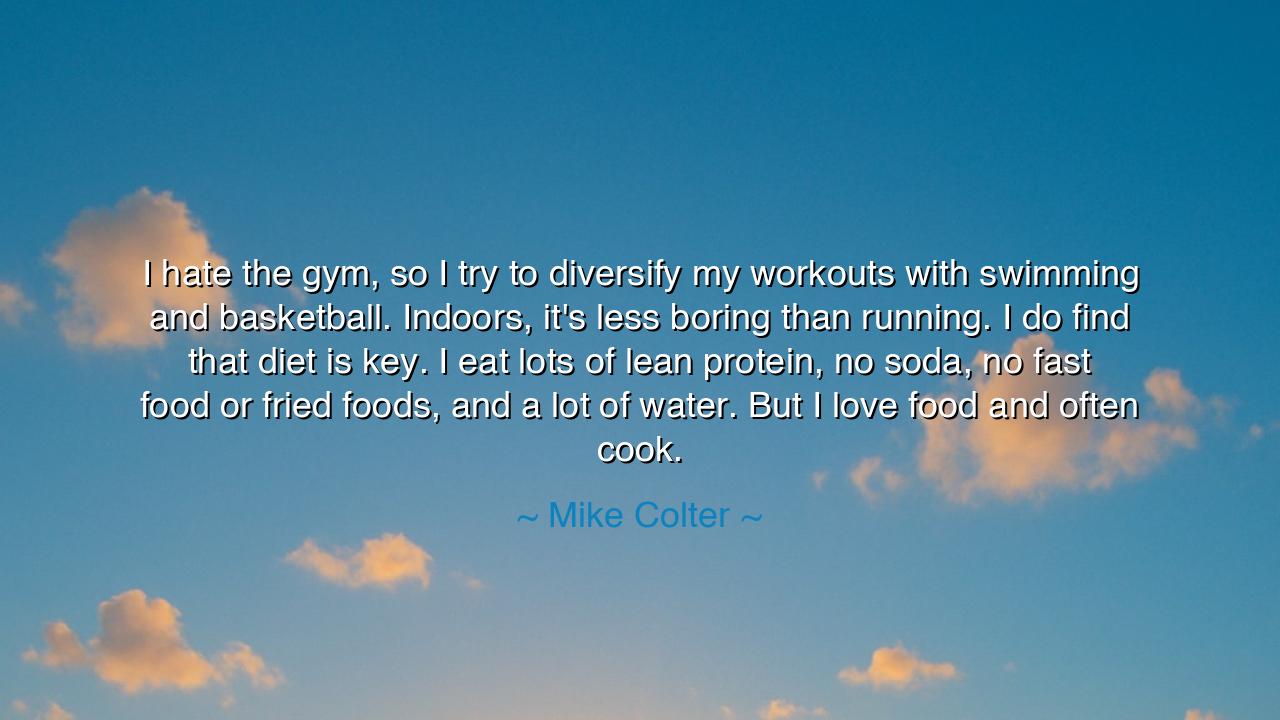
I hate the gym, so I try to diversify my workouts with swimming
I hate the gym, so I try to diversify my workouts with swimming and basketball. Indoors, it's less boring than running. I do find that diet is key. I eat lots of lean protein, no soda, no fast food or fried foods, and a lot of water. But I love food and often cook.






The words “I hate the gym, so I try to diversify my workouts with swimming and basketball. Indoors, it's less boring than running. I do find that diet is key. I eat lots of lean protein, no soda, no fast food or fried foods, and a lot of water. But I love food and often cook.” by Mike Colter speak not merely of fitness or diet — they reveal a philosophy of balance, discipline, and joy in self-care. Beneath the casual tone lies an ancient wisdom: that health is not achieved through punishment, but through harmony; not through denial, but through understanding the rhythm between body, mind, and pleasure. Colter, known for his strength and physicality, expresses here the eternal truth that true power arises not from brute endurance, but from consistency and self-respect.
To say “I hate the gym” is, in essence, to reject monotony. Colter’s words remind us that health is not a rigid formula, but a living art — one that must adapt to the soul’s temperament. The ancients knew this well. The Greeks trained not merely in halls of stone but in the open air, among olive groves and sea winds. They ran on beaches, wrestled in fields, and swam in rivers. For them, movement was not a task but a celebration of being alive. Colter’s choice to diversify his workouts — to swim, to play basketball — echoes this ancient joy in movement, proving that fitness, when approached with creativity and spirit, becomes a form of freedom, not obligation.
Yet he also speaks of something deeper — the quiet realization that “diet is key.” In these simple words lies one of life’s oldest lessons: that we become what we consume, and that every choice we make at the table shapes the destiny of the body and the mind. To eat clean, to drink water instead of soda, to choose nourishment over indulgence — these are not acts of denial, but of self-mastery. Lean protein and fresh food are not symbols of restriction, but of strength drawn from the earth’s bounty. They reflect what the sages of old knew: that food, when chosen with reverence, becomes the foundation of discipline, clarity, and vitality.
Throughout history, the great warriors, philosophers, and healers all recognized the sacred relationship between nourishment and virtue. The Spartans, famed for their strength, maintained austere diets to sharpen their focus and endurance. The Romans, though conquerors, understood moderation as a mark of wisdom. And the Japanese samurai, before battle, ate simple meals of rice, fish, and miso to steady both hand and spirit. In this lineage stands Colter’s quiet commitment — a modern echo of an ancient truth: that health is built not in the moment of action, but in the discipline of preparation.
Still, he reminds us that pleasure is not the enemy of health. “I love food,” he confesses, “and often cook.” In these words lies the secret harmony between duty and delight. To love food, to create it with one’s own hands, is to transform necessity into art. The act of cooking connects us with nature’s rhythms — the chopping of herbs, the sizzling of oil, the scent of something wholesome rising from the pan. This, too, is meditation, an acknowledgment that health is not about deprivation, but about mindful enjoyment. The ancients shared feasts not to indulge, but to celebrate gratitude — for life, for harvest, for company.
From this reflection arises a profound lesson: sustainability in health comes not from extremes, but from joy. The man who forces himself into routines he hates will soon abandon them; the one who finds movement that delights him, food that nourishes him, and rest that restores him will endure. To care for the body should not be punishment — it should be reverence. The gym, the pool, the kitchen — all are temples where one can honor the divine within the flesh.
So, dear listener, learn from Mike Colter’s simple truth: do not seek perfection; seek balance. Move in ways that enliven you. Eat what strengthens you, not what numbs you. Drink water as if it were life itself. And when you eat, do so with joy and gratitude, for that joy feeds more than the body — it feeds the soul. In this way, you will discover that the path to strength and beauty is not paved with suffering, but with discipline guided by love, and effort sustained by delight.






AAdministratorAdministrator
Welcome, honored guests. Please leave a comment, we will respond soon